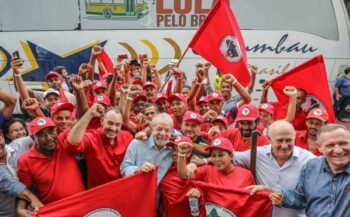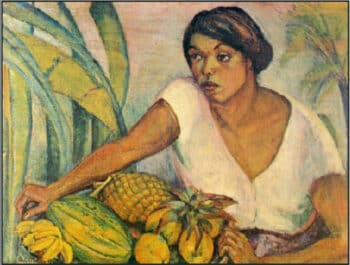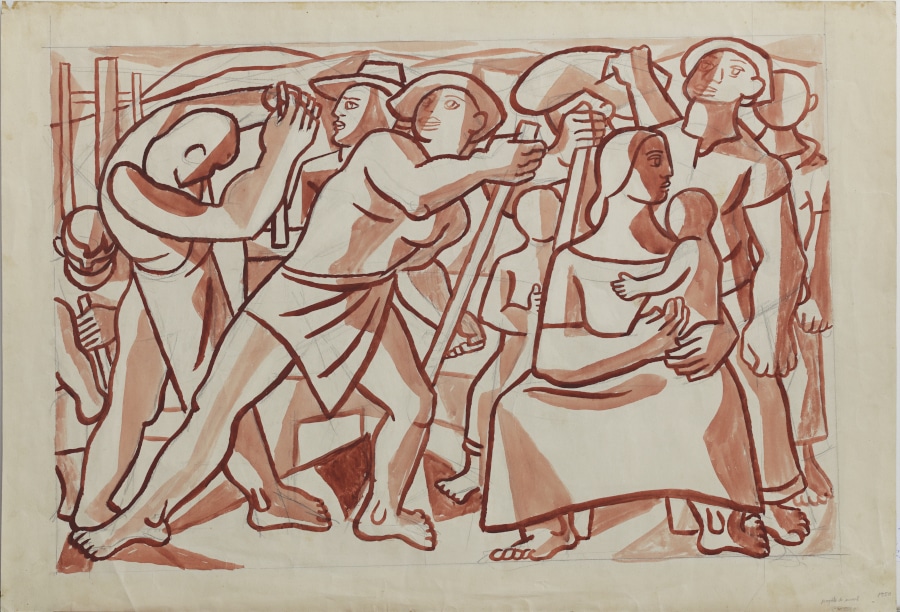Dear friends,
Greetings from the desk of Tricontinental: Institute for Social Research.

Ricardo Stuckert, Lula visits the MST in Espírito Santo, 2020.
In the last week of October, João Pedro Stedile, a leader of the Landless Workers’ Movement (MST) in Brazil and the global peasants’ organisation La Via Campesina, went to the Vatican to attend the International Meeting of Prayer for Peace, organised by the Community of Sant’Egídio. On 30 October, Brazil held a presidential election, which was won by Luiz Inácio Lula da Silva, affectionately known as Lula. A key part of his campaign addressed the reckless endangerment and destruction of the Amazon by his opponent, the incumbent President Jair Bolsonaro. Lula’s victory, helped along by vigorous campaigning by the MST, provides hope for our chance to save the planet. This week’s newsletter contains the speech that Stedile gave at the Vatican. We hope you find it as useful as we do.
Today, humanity is at risk because of senseless social inequality, attacks on the environment, and an unsustainable consumption pattern in rich countries that is imposed on us by capitalism and its profit-seeking mentality.
Part 1: What are the dilemmas facing humanity?
- Climate change is permanent, and its impacts manifest every day with intense heat waves, global warming, torrential rains, tropical cyclones, and droughts in different regions across the planet.
- The number of disasters/crimes has increased five-fold in the last 50 years, killing 115 people and causing economic losses of $202 million per day.
- Environmental crimes have increased, such as deforestation, the burning of tropical forests, and attacks on all biomes, especially in the Global South. In 2021 alone, the world lost 1 million hectares of tropical forests.
- The Amazon rainforest, which stretches across nine countries, has already lost 30% of its vegetation cover as a result of encroaching deforestation caused by the push to produce timber and make way for cattle ranching and soybean production, which are exported to Europe and China.
- All biomes in the Global South are being destroyed to produce raw agricultural materials for the Global North.
- Predatory mining affects the environment, water, and land as well as Indigenous and peasant communities as thousands of garimpeiros (illegal miners) mine gold and diamonds using hazardous materials such as mercury in Indigenous lands.
- Never have so many agrotoxins (agricultural poisons) been used in agriculture in the South, affecting soil fertility, killing biodiversity, polluting groundwater and rivers, and contaminating what is produced and even the atmosphere.
- Glyphosate is scientifically proven to cause cancer. Some 42,700 U.S. farmers who contracted cancer won the right to compensation from the companies that produce, sell, and use the glyphosate to which they were exposed.
- Across the planet, more and more genetically modified seeds are being planted, including, as of 2019, a total of nearly 200 million hectares concentrated in 29 countries. These seeds cause genetic contamination in non-GMO seeds, affecting human health and destroying the planet’s biodiversity because they require the use of agrotoxins.
- The oceans are polluted by plastics and other human waste, killing many species of fish and marine life. The massive use of chemical fertilisers has also caused ocean waters to acidify, putting all marine life at risk. Evidence of this can be seen in the large garbage patch in the Pacific Ocean, which covers over a million square kilometres.
- The carbon dioxide emitted by burning fossils fuels and by individual transportation in automobiles causes pollution in large cities, which in turn causes the death of thousands of people, with 7,100 in the northeast and Mid-Atlantic region of the United States alone dying as a result of vehicle emissions in a single year.
- Humanity is suffering under a public health crisis that is also inextricably connected to nature. Epidemics and pandemics have increased, creating a massive global health crisis that puts millions of people at risk. This phenomenon, often propelled by the increased transmission of diseases from animals to human beings (known as zoonoses), is a result of the simultaneous destruction of biodiversity alongside the expansion of the agricultural frontier by agribusiness and energy, mining, and transportation megaprojects as well as urban and large-scale livestock farming.
- Many areas on our planet are protected by peasant and Indigenous communities. Capital attacks and seeks to destroy them in order to take control of the natural goods they protect.
- We are undergoing an ecological-social crisis of the Earth system and of the balance of life. This global crisis affects the environment, the economy, politics, society, ethics, religions, and the meaning of our own life.
- The billions of the world’s poorest people are the most impacted by the lack of food, water, housing, employment, income, and education. Deteriorating living conditions have forced them to migrate and have killed thousands of people, especially children and women.
- This generalised crisis is endangering human life. Without bold action, the planet, which is under attack, could still regenerate, but without human beings.

Eduardo Berliner (Brazil), House, 2019.
Part 2: Who is responsible for putting humanity at risk?
- Capitalism is facing a structural crisis. It is no longer capable of organising the production and distribution of goods that people need. Its logic of profit and capital accumulation prevent us from having a more just and egalitarian society.
- This crisis manifests itself in the economy, in increasing social inequality, in the state’s failure as a guarantor of social rights, in formal democracy’s failure to respect the will of most people, and in the propagation of false values based solely on individualism, consumerism, and selfishness. This system is economically and environmentally unsustainable, and we must put it behind us.
- The main parties directly responsible for the environmental crisis are large transnational corporations, which do not respect borders, states, governments, or the rights of peoples. Some of these corporations, such as Bayer, BASF, Monsanto, Syngenta, and DuPont, manufacture agrotoxins, while others run the mining, automobile, and fossil fuel-run electric energy sectors, and yet others control the water market (such as Coca-Cola, Pepsi, and Nestlé) and the world food market. Associated with all of them are banks and their financial capital. In the last decade, these corporations have been joined by powerful transnational technology corporations, which control ideology and public opinion (Amazon, Microsoft, Google, Facebook/Meta, and Apple). The owners of these companies are among the richest people in the world.
-
- governments that cover up and protect corporate crime;
- the mainstream media, which seek profit and serve corporate interests all whilst deceiving the people and hiding those who are responsible; and
- international organisations formed by governments and captured by large corporations under the cover of phantom foundations, which directly influence these organisations and only repeat rhetoric and hold ineffective international meetings such as the Conference of the Parties (COP), which has now met 27 times. This is even the case with the United Nations and the Food and Agricultural Organisation.However, corporations are not the only ones to blame for the environmental crisis; they are aided by:All of these entities must respect the law.
- I welcome the courageous position taken by Colombia’s President Gustavo Petro at the United Nations General Assembly in September 2022 and the encyclicals of Pope Francis. Both are a wake-up call to the entire world.

Tarsila do Amaral (Brazil), O Vendedor de frutas (‘The Fruit Vendor’), 1925.
Part 3: What solutions are we calling for?
There is still time to save humanity, and, with it, our common home, planet Earth. For this we need to have the courage to implement concrete and urgent measures on a global level. On behalf peasants’ movements and people’s movements in urban peripheries, we propose:
- Prohibiting deforestation and commercial burning in all native forests and savannas across the world.
- Prohibiting the use of agrotoxins and genetically modified seeds in agriculture, as well as antibiotics and growth promoters in livestock farming.
- Condemning all decoy solutions to climate change and geoengineering techniques proposed by capital that speculate on nature, including the carbon market.
- Prohibiting mining in the territories of Indigenous peoples and traditional communities as well as environmental protection and conservation areas and demanding that all mining be publicly controlled and used for the common good—not for profit.
- Strictly controlling the use of plastics, including in the food and beverage industry, and making it mandatory to recycling them.
- Recognising nature’s goods (such as forests, water, and biodiversity) as universal common goods at the service of all people that are immune to capitalist privatisation.
- Recognising peasants as the main caretakers of nature. We must fight against large landowners and carry out popular agrarian reforms so that we can combat social inequality and poverty in the countryside and produce more food in harmony with nature.
- Implementing an extensive reforestation program, paid for with public resources, that ensures the ecological recovery of all areas near springs and riverbanks, slopes, and other ecologically sensitive areas or areas that are experiencing desertification.
- Implementing a global policy to care for water that prevents the pollution of oceans, lakes, and rivers and that eliminates the contamination of surface and subsoil drinking water sources.
- Defending the Amazon and other tropical forests of Africa, Asia, and the Pacific Islands as ecological territories under the care of the peoples of their countries.
- Implementing agroecology as a sociotechnical basis for food sovereignty, including the production of healthy food that is accessible to all.
- Subsidising the financing needed to implement solar and wind energy systems, which will be under the collective management of populations worldwide.
- Implementing a global investment plan to provide public transportation based on renewable energies that makes it possible to reorganise and improve living conditions in cities, allowing for urban decentralisation and making it possible for people to remain in the countryside.
- Demanding that the industrialised countries of the North guarantee the financial resources to implement all of the necessary actions to rebuild the relationship between society and nature in a sustainable manner, understanding that these countries are historically responsible for global pollution and continue with unjust and unsustainable patterns of production and consumption.
- Demanding that all governments stop wars, close foreign military bases, and halt military aggression in order to save lives and the planet, rooted in the understanding that peace is a condition for a healthy life.

Anita Malfatti (Brazil), Tropical, 1917.
For these ideas to materialise, we propose an international pact between religious leaders and institutions, environmental and people’s movements, decision-makers, and governments, so that we can carry out a programme that raises the consciousness of the entire population. We propose that an international conference be held so that we can bring together all collective actors who defend life. We must encourage people to fight for their rights in defence of life and nature. We must demand that the media assume its responsibility to defend the interests of the people and to defend equal rights, life, and nature.
We will always fight to save lives and our planet, to live in solidarity and in peace with social equality, emancipated from social injustices, exploitation, and discrimination of all kinds.
This text from João Pedro Stedile is a clarion call from the MST, which Noam Chomsky calls ‘the most important mass movement on the planet’. We hope to hear from you about these proposals, and we hope that movements around the world will take them up in their work.

Emiliano Di Cavalcanti (Brazil), Projeto de Mural (‘Mural Project’), 1950.
Warmly,
Vijay

